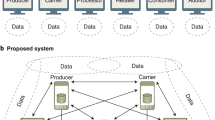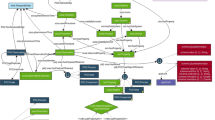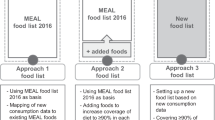Abstract
Background/Objectives:
The main aim of the European Food Information Resource (EuroFIR) project is to develop and disseminate a comprehensive, coherent and validated data bank for the distribution of food composition data (FCD). This can only be accomplished by harmonising food description and data documentation and by the use of standardised thesauri.
Subjects/Methods:
The data bank is implemented through a network of local FCD storages (usually national) under the control and responsibility of the local (national) EuroFIR partner.
Results:
The implementation of the system based on the EuroFIR specifications is under development. The data interchange happens through the EuroFIR Web Services interface, allowing the partners to implement their system using methods and software suitable for the local computer environment. The implementation uses common international standards, such as Simple Object Access Protocol, Web Service Description Language and Extensible Markup Language (XML). A specifically constructed EuroFIR search facility (eSearch) was designed for end users. The EuroFIR eSearch facility compiles queries using a specifically designed Food Data Query Language and sends a request to those network nodes linked to the EuroFIR Web Services that will most likely have the requested information. The retrieved FCD are compiled into a specifically designed data interchange format (the EuroFIR Food Data Transport Package) in XML, which is sent back to the EuroFIR eSearch facility as the query response. The same request–response operation happens in all the nodes that have been selected in the EuroFIR eSearch facility for a certain task. Finally, the FCD are combined by the EuroFIR eSearch facility and delivered to the food compiler.
Conclusions:
The implementation of FCD interchange using decentralised computer systems instead of traditional data-centre models has several advantages. First of all, the local partners have more control over their FCD, which will increase commitment and improve quality. Second, a multicentred solution is more economically viable than the creation of a centralised data bank, because of the lack of national political support for multinational systems.
This is a preview of subscription content, access via your institution
Access options
Subscribe to this journal
Receive 12 print issues and online access
$259.00 per year
only $21.58 per issue
Buy this article
- Purchase on Springer Link
- Instant access to full article PDF
Prices may be subject to local taxes which are calculated during checkout


Similar content being viewed by others
References
Becker W, Møller A, Ireland J, Roe M, Unwin I, Pakkala H (2008). Proposal for structure and detail of a EuroFIR standard on food composition data II: Technical Annex. Danish Food Information. Retrieved 13 April 2010 from: http://www.eurofir.eu/sites/default/files/Deliverables/D1.8.19.pdf.
Becker W, Unwin I, Ireland J, Møller A (2007). Proposal for structure and detail of a EuroFIR standard on food composition data I: description of the standard. http://www.eurofir.net/sites/default/files/TechWeb%20Downloads/WebServices/EuroFIR_Web_Services_Specifications_Version_1_0.pdf.
Bell S, Colombani P, Christensen T (2008). Report on new FCDB uses or new user groups outside the e-Health area. Retrieved 28 June 2010 from: http://www.eurofir.net/sites/default/files/Deliverables/D1.8.12.doc.
CEN (European Committee for Standardization) (2009). CEN/TC 387. Food data—Data structure. Retrieved 7 December 2009 from: http://www.cen.eu/.
EuroFIR (2010). EuroFIR—Public homepage. Retrieved 13 April 2010 available at: http://www.eurofir.eu/.
EuroFIR AISBL (2010). The innovative EuroFIR interface. Retrieved 13 April 2010 from: http://eurofir.org/eurofir_aisbl/membership_benefits/eurofir_esearch_facility.
Holcíková K (2000). CEECFOODS—Network on Food Composition for Central and Eastern European Countries. J Food Compos Anal 13, 705–707.
Ireland J (2007). Report on food record retrieval using proposed description and classification. EuroFIR. Retrieved 28 June 2010 from: http://www.eurofir.net/sites/default/files/Deliverables/D1.8.1.doc.
Møller A, Christensen T (2008). EuroFIR Web Services—Food Data Transport Package, Version 1.3. EuroFIR Technical Report. EuroFIR. Retrieved 13 April 2010 from: http://www.eurofir.net/sites/default/files/TechWeb%20Downloads/WebServices/D1.8.29CoverWithDocument.pdf.
Møller A, Ireland J (2008). LanguaL 2008—The LanguaL Thesaurus. EuroFIR Technical Report. Danish Food Information. Retrieved 28 June 2010 from: http://www.eurofir.net/sites/default/files/TechWeb%20Downloads/LanguaL/LanguaL2008/LanguaL%202008%20Thesaurus.pdf.
Møller A, Unwin I, Becker W, Ireland J (2007). EuroFIR's food databank systems for nutrients and bioactives. Trends Food Sci Tech 18, 428–433.
Pakkala H, Christensen T, Gunnarsson Í, Kadvan A, Keshet B, Korhonen T et al. (2008a). EuroFIR Web Services: Background Report. EuroFIR Technical Report. EuroFIR. Retrieved 27 May 2010 from: http://eurofir.org/sites/default/files/TechWeb%20Downloads/WebServices/EuroFIR_Web_Services_Background_Report.pdf.
Pakkala H, Martínez de Victoria I, Christensen T, Unwin I, Korhonen T, Gunnarsson I et al. (2008b). EuroFIR Web Services—Specification of request-response message exchange patterns, Version 1.0. EuroFIR Technical Report. http://eurofir.org/sites/default/files/TechWeb%20Downloads/WebServices/EuroFIR_Web_Services_Specifications_Version_1_0.pdf.
Pakkala H, Møller A, Korhonen T, Christensen T, Nørby E (2009). XML schemata for EuroFIR Food Transport Package 1.3. Version 1.1. http://eurofir.org/sites/default/files/TechWeb%20Downloads/XML%20Food%20Transport%20Package/fdtp_schemata_documentation_1_1.pdf.
Schlotke F, Becker W, Ireland J, Møller A, Ovaskainen M-L, Monspart J et al. (2000). EUROFOODS Recommendations for Food Composition Database Management and Data Interchange. J Food Comp Anal 13, 709–744.
Scrimshaw N (1997). INFOODS: The International Network Of Food Data Systems. Am J Clin Nutr 65 (Suppl), 1190S–1193S.
Slimani N, Deharveng G, Unwin I, Southgate DAT, Vignat J, Skeie G et al. (2007a). The EPIC nutrient database project (ENDB): a first attempt to standardize nutrient databases across the 10 European countries participating in the EPIC study. Eur J Clin Nutr 61, 1037–1056.
Slimani N, Deharveng G, Unwin I, Vignat J, Skeie G, Salvini S et al. (2007b). Standardisation of an European end-user nutrient database for nutritional epidemiology: what can we learn from the EPIC Nutrient Database (ENDB) Project? Trends Food Sci Tech 18, 407–419.
Westenbrink S, Oseredczuk M, Castanheira I, Roe M (2009). Food composition databases: the EuroFIR approach to develop tools to assure the quality of the data compilation process. Food Chem 113, 759–767.
W3C (World Wide Web Consortium) (2001). Web Service Definition Language (WSDL). Retrieved 25 June 2008 from: http://www.w3.org/TR/wsdl.
W3C (World Wide Web Consortium) (2007). SOAP Specifications. Retrieved 25 June 2008 from: http://www.w3.org/TR/soap12-part1/.
W3C (World Wide Web Consortium) (2008a). Extensible Markup Language (XML) 1.0 (5th edn). Retrieved 9 December 2008 from: http://www.w3.org/TR/2008/REC-xml-20081126/.
W3C (World Wide Web Consortium) (2008b). World Wide Web Consortium—Web Standards. Retrieved 30 June 2008 from: http://www.w3.org/.
Acknowledgements
This work was completed on behalf of the EuroFIR consortium and funded under the EU 6th Framework Food Quality and Safety Programme (FOOD-CT-2005-513944). The authors thank all colleagues in the EuroFIR project who have contributed to this work, in particular Paolo Colombani (ETH Zurich), Ívar Gunnarsson (Hugsjá ehf), Bernd Hartmann (Max Rubner-Institut, Karlsruhe), Jayne Ireland (Danish Food Information), Benny Keshet (Ben-Gurion University of Negev), Tommi Korhonen (National Institute for Health and Welfare, THL), Anders Møller (Danish Food Information) and Erik Nørby (Polytec).
Author information
Authors and Affiliations
Corresponding author
Ethics declarations
Competing interests
The authors declare no conflict of interest.
Additional information
Contributors: HP conceived the original idea together with TC, IMV and KP. All participated in writing the specifications on which this paper is based on. HP wrote the first draft; TC, IMV, KP and AK conceived and refined the original idea and critically appraised the paper.
Rights and permissions
About this article
Cite this article
Pakkala, H., Christensen, T., Martínez de Victoria, I. et al. Harmonised information exchange between decentralised food composition database systems. Eur J Clin Nutr 64 (Suppl 3), S58–S63 (2010). https://doi.org/10.1038/ejcn.2010.212
Published:
Issue Date:
DOI: https://doi.org/10.1038/ejcn.2010.212
Keywords
This article is cited by
-
The 3rd International EuroFIR Congress 2009: European Food Composition Data for Better Diet, Nutrition and Food Quality
European Journal of Clinical Nutrition (2010)



